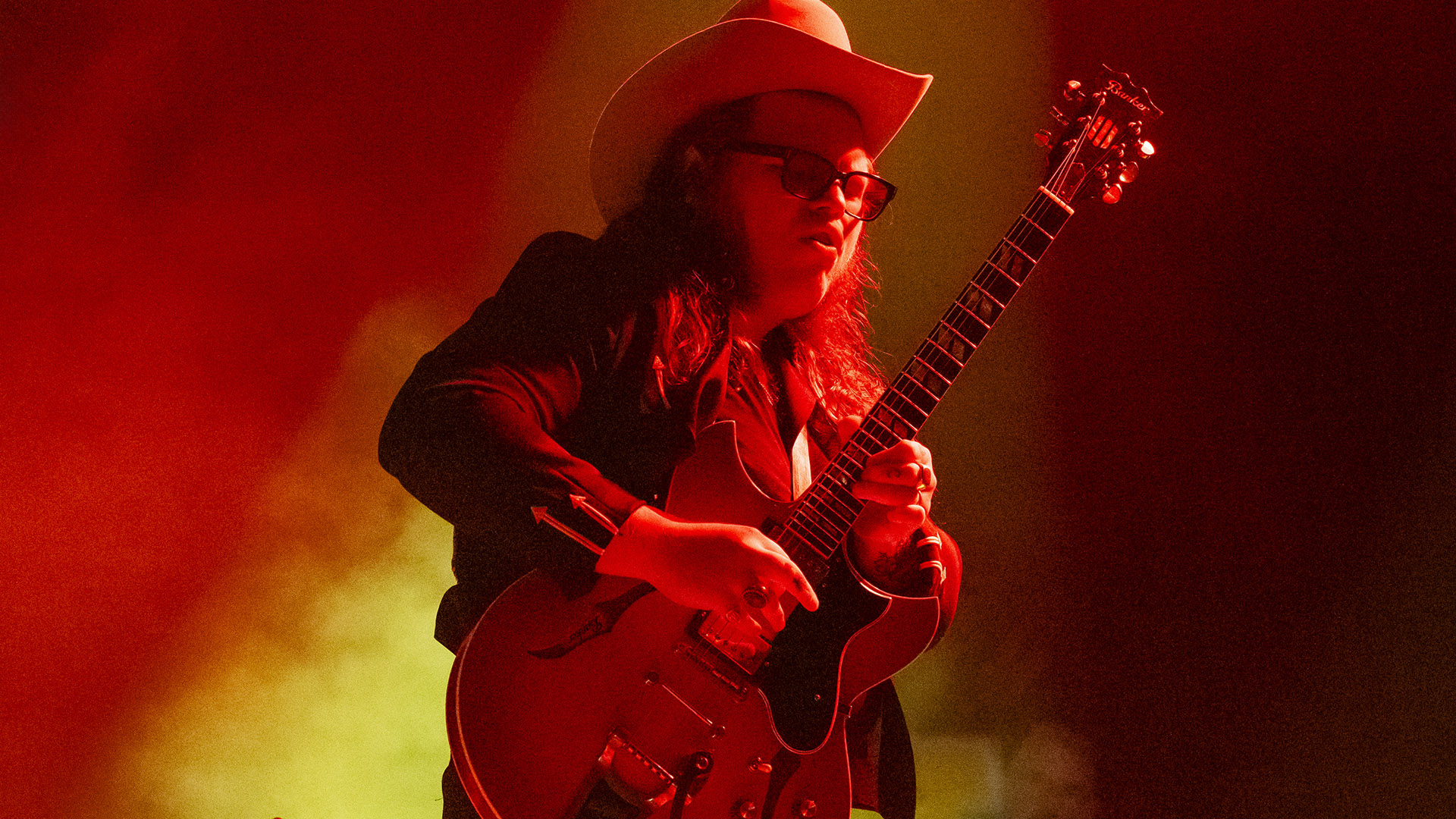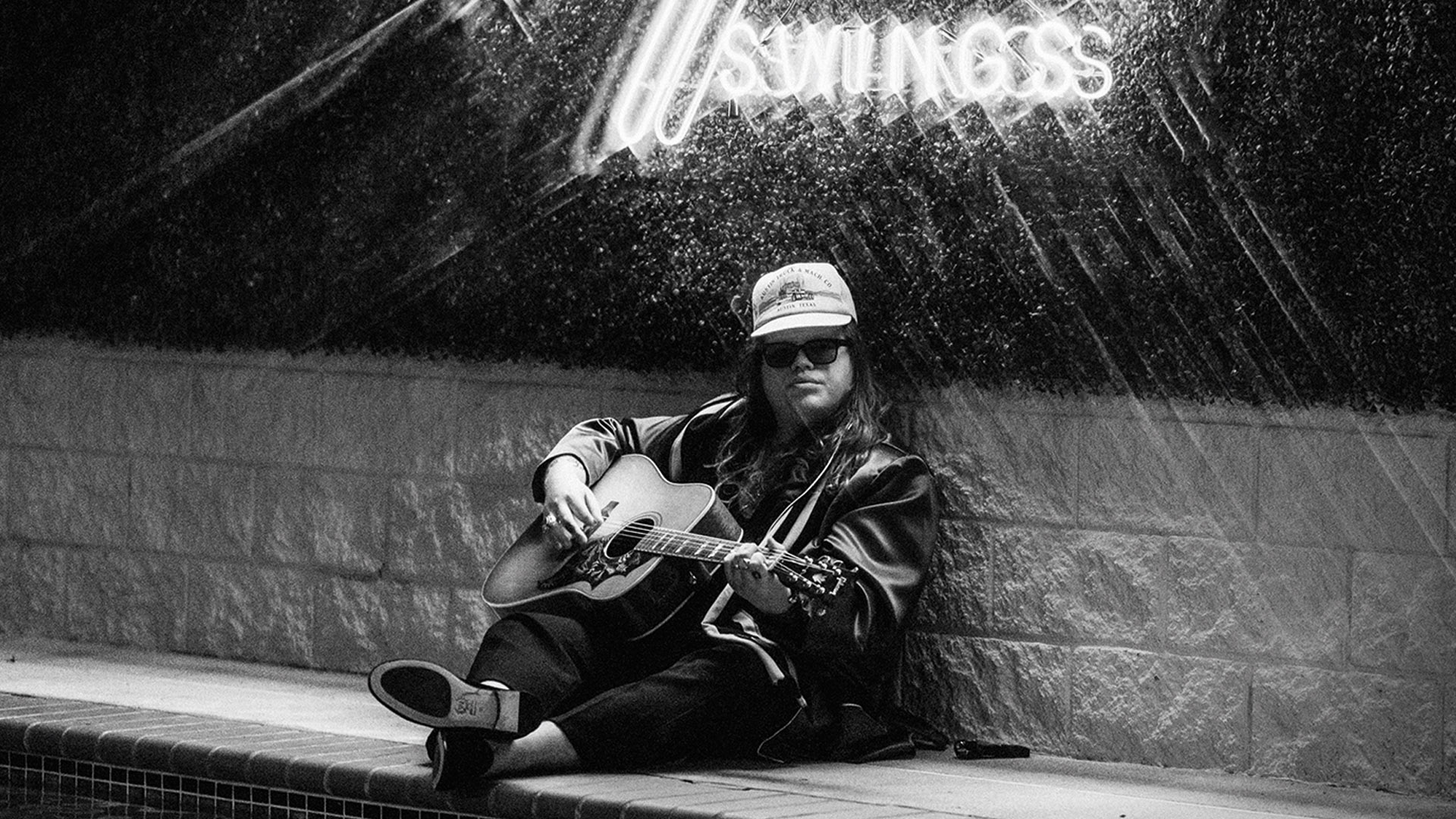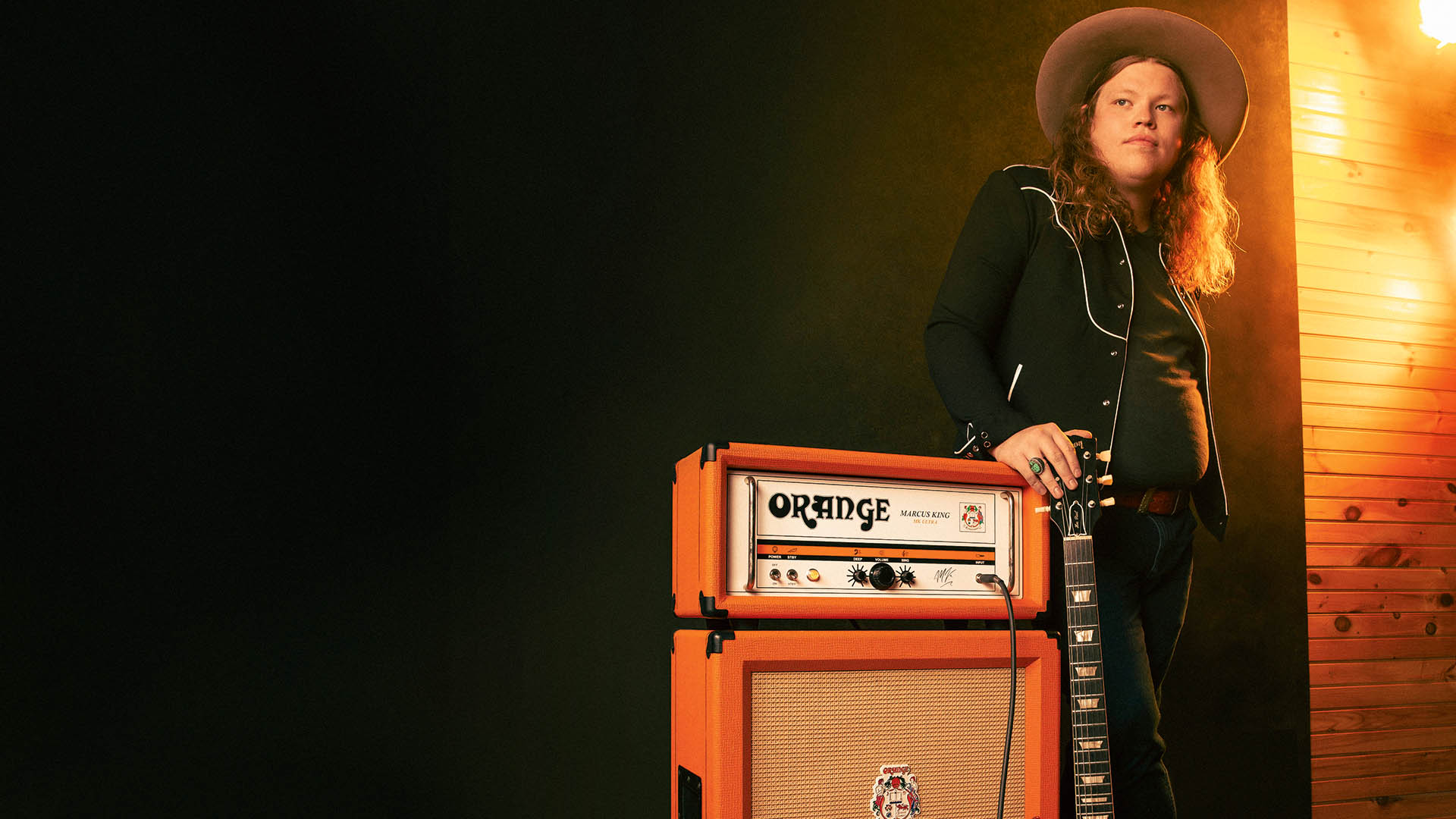“I have a Southern accent, and it’s the same on the guitar. I adapted the guitar to do the talking for me when I was too shy”: Marcus King on why your fretboard has its own language – and how mental health became his muse
The Americana-loving singer-songwriter digs into the ties between the ebb and flow of his emotional state and the safe space inherent in the well-worn fretboard of his beloved Big Red

The modern guitar scene is brimming with pyrotechnics based on speed, agility and clicks via social media. Marcus King, however, bypasses all of that in favour of a straight-up vibe check.
“Other people might have a larger vocabulary, and they’re going to speak more eloquently,” he tells Guitarist. “I have the vocabulary that I have. I have a Southern accent, and it’s the same on the guitar. I adapted the guitar to do the talking for me when I was too shy. The basic root of my playing is to try not to think about it but allow myself to just express things wholly.”
King has been keen on self-expression lately. His record Mood Swings (which dropped in April 2024 and was produced by Rick Rubin) exposed the 28-year-old Greenville, South Carolina native’s unladen emotion with brushstrokes of well-timed guitar. For some, laying one’s soul bare would be intimidating, but not for King, who used his guitar – aka his ‘safe space’ – to fill in the blanks.
“You go through life and you pick up things,” he says. “You spend a lot of time around people you admire and, through osmosis, that starts to show in how you speak and tell stories. It’s the same for playing guitar; it’s all very organic.”
Elsewhere, King piloted his Curfew Foundation, which provides a space for musicians struggling with mental health challenges, and the Marcus King Family Reunion, a festival based on good times, good food and good music.
He’s battled demons, knowing that the struggle will be never-ending, but King’s talent and down-to-earth personality win, no matter what he does. “I’m trying to create art,” he says. “This last record pushed me to create something for myself. It’s the Field Of Dreams mentality, where if you build it, they will come.”
And according to King, there is more to come beyond Mood Swings. “You’ve got to be honest and true to yourself,” he adds. “The only thing I can guarantee to my listeners is that anything I put out will be something I really believe in.
Get The Pick Newsletter
All the latest guitar news, interviews, lessons, reviews, deals and more, direct to your inbox!
“And I’m believing in what I’m working on with my band in the studio right now. We have a new record that we’re putting out in the first quarter of next year [2025]. It’s the most excited I’ve been about a new record since I can remember, truly.”
Mood Swings has been a new adventure for you. What brought you to this point?
“It started from a conversation I had with Rick Rubin. He and I talked about mental health as it relates to the creative process. Basically, that reshaped my thoughts on [the subject] and helped me view what I thought was holding me back.”
How did this view present itself?
“I reshaped it all and looked at my mental health as a writing partner. In many ways, the record concept started to take shape around one song, Bipolar Love. Without the usage of metaphor, it just spoke directly about the challenges I go through as they relate to my relationships and how they’re tumultuous because I wasn’t concentrating on my mental health.”
Have these mental health challenges held you back during your career?
“In a way, my most consistent muse – because sometimes muses come and go – is mental health. Mental health, or lack thereof, has always remained. I’ve been working on improving it in positive ways, and getting through it with my art has always been the positive way to do that.”
So how would you describe your process as a guitarist and musician now?
“It’s rooted in a form of transcendentalism, which is rooted in a fundamental understanding of the neck and the notes. It’s an intimate understanding and familiarity with the instrument and trying to understand it to the best of my capability.
“It’s how every note on the neck relates to one another and how I can express myself fully on the instrument – sometimes better than I can with words.”
Would the guitar have been a safe space for you?
“Absolutely. Guitar has always been there. It’s the most consistent companion I’ve had.”
What did life look like for you growing up? Do you have musicians in the family?
“My dad was a player. Still is. My grandfather, too. My grandfather – and other folks from that generation – were sometimes bitter and angry because life’s a bitch. You work hard your whole life and things still tend to fall apart. It’s hard to have control over everything.”

Does that contribute to why you now use the guitar as a safe space?
“I saw music, or playing music, as an expression. Even the saltiest fuckers that I’d see at the family scenes would have a smile on their faces when they were playing. Subconsciously, I was drawn to it as a form of escapism. I was really lonely as a kid; I spent a lot of time alone and the guitar always made me happy. It was my best pal.”
The fretboard is connected. There are 12 notes and I try to be less overwhelmed by it and not let it be so intimidating
Did that lead you to look at the instrument or the fretboard differently than you might have otherwise?
“I started seeing it as a roadmap. All these places are intertwined, with roundabouts and paths that lead to the same thing. The fretboard is connected. There are 12 notes and I try to be less overwhelmed by it and not let it be so intimidating.”
How do you find a balance between self-expression and technical knowledge?
“The more I’ve grown as a person, the more I’ve found it relates to my playing and my ability to express myself on the instrument. The less I hold back emotionally or in my personal life, the less I hold back musically. It’s a language, or a dialect, that I speak.
“With English, you’ll run into a guy who learned a new word, and he fits it into every fucking sentence. It’s like, ‘That’s cool, but you might be overusing it, or you don’t understand.’ It’s the same way when I get a new idea on guitar.”
The record itself has a different vibe and expanded musical language. Does that have to do with the fact that it’s an emotional release, too?
“Big time. This is the platform I feel most comfortable expressing myself in. It’s basically about dealing with emotional disorders, mental bullshit in a relationship, and trying to open yourself up enough to deal with it and learning how to live with it.”
Why did you need to dial back the guitars to get that release?
“We wanted what remained on the record to be structurally integral to songs. Like with Fuck My Life Up Again, we wanted it to be a garnish more than anything else as far as guitars. The guitar is a form of expression, and sometimes guitar immediately subcategories you into rock or blues, and I wanted this music to live in a space without boundaries. I wanted the guitar to be a means of expression, rather than the primary pillar.”
People tend to classify you as strictly a guitarist, but you’re stretching out far beyond that now.
“There’s a lot more. I’m comfortable with not giving a shit what people classify me as. I don’t mean to be arrogant; I classify myself as a musician and a lover of all Americana. I love literature and mid-century architecture – I love all things Americana. That’s where I write from.
“I love the music birthed here on the soil of the States, and I go back even further to Appalachia fiddle – which was a big part of my upbringing – but that came from Ireland. I’m a fan of all that came before me, and I want my music to be a direct expression that correlates with how I speak and carry myself. I want people to hear it and say, ‘Oh, that’s Marcus talking over there.’”

On the gear side, you launched your signature Orange tube amp, the MK Ultra, a few years back. What’s kept you coming back to Orange?
It’s basically a British amplifier with American technology and tubes, and it’s hand-wired in the USA. I couldn’t be prouder of that amplifier. It’s really what I am
“I’m a big fan of aesthetics. The look of Orange amplifiers, you know, I was really into that – it’s a really hip look. And when I started to work with them, I was really honest, saying, ‘There’s too many options.’ I went, ‘I go and sit in somewhere, and if it’s an Orange Rockerverb, I don’t know what the fuck to do.’ I’m not an engineer, and it’s all hieroglyphics… I don’t know what the hell’s going on.”
“[So for my signature amp], I was like, ‘I don’t want any of that shit.’ They took my criticism well, so I said, ‘I want three knobs and something between a Fender Super Reverb and a 50-watt Marshall Plexi.’ That’s what they did. It’s basically a British amplifier with American technology and tubes, and it’s hand-wired in the USA. I couldn’t be prouder of that amplifier. It’s really what I am.”
You’re seldom seen without your Gibson ES-345. Is that the guitar that means the most to you?
“Oh, yeah. Big Red was my grandfather’s guitar. My dad gave it to me when I was 18. He gave it to me to take on the road, and just as Dorothy [from The Wizard Of Oz] has her ruby red slippers, I have my red Gibson guitar. It’s like a little piece of home, and it lets me get back there whenever I need to.”
Do you find it just as easy to express yourself on non‑vintage instruments?
“I’ve got some new guitars in the arsenal. When I’m flying overseas and I gotta check the guitars, I need to bring new guitars just in case they get busted up. But the expression, really, I feel like if you gave me a set of spoons and that’s all I had to express myself, for a true artist, it doesn’t matter what the medium or canvas is. But I like quality instruments.”
When you look at today’s guitar scene, which often relies on social media and farming for clicks, do you get a sense that things are headed in a healthy direction?
“You don’t want the soul to be detached from things because you’ll just have gratuitous shredding. But there’s hope for the future; it’s just a matter of putting less focus on things and letting the guitar speak for itself. That’s my approach.
“I just love the guitar so much. I want to bring the guitar into the zeitgeist. I want people to accept it and understand it. If you go over people’s heads, like really outside of the fringe, or if you’re on the fringe and trying to coerce people to reach out to you, they’ll be less inclined to do so. I want to take the guitar with me, bring it into the state of music now and make it something everybody can enjoy.”
What’s the key to making that happen?
“I look at it like people can go out and make really incredible pieces of art, like a movie that’s a hit with everybody, but it’s really just an artistic masterpiece – and that’s really neat. But it kind of affected everyone… I want to handle the guitar the same way. I want to get everybody onboard without excluding anybody.”
Is that and your openness about mental health why you’ve become involved with so much outreach lately?
“Yeah, I want to create as much outreach and advocacy as possible. I also want to spread as much musical awareness about mental health in the music community – and the arts community overall. It’s about spreading the word that it’s tough out there and that you’re not alone when it comes to the emotions that you’re feeling.”
For a long time, there was a huge stigma regarding mental health in the music community.
“I’m trying to take the stigma off it, like destigmatising the idea that it’s okay not to be okay. That’s where it’s at. That’s the basic idea of the Curfew Foundation and the [Marcus King] Family Reunion. I want people from all walks of life to come together and share a meal, music and sunshine. It’s about bringing people together. That’s the truth of it.”
What advice would you give to someone in your line of work who is suffering?
There’s good days and bad days. Depression is something that I feel and it never really goes away. I’m just in remission
“Don’t be afraid to let them think you’re crazy. Artists are supposed to be a little bit crazy, right? Just take it in. I found a lot of peace through embracing the crazy side. When I have days like yesterday when I was in Milwaukee and just having a rough day, where I didn’t get enough sleep, and it just amplifies and overstimulates my senses and I have a bad mental health day, I put myself in time out and take a nap.
“There’s good days and bad days. Depression is something that I feel and it never really goes away. I’m just in remission. So I’d tell people not to be surprised when it comes back around – and it will come back around when you least expect it. That’s the fucked-up truth about it. It wants to try to remind you that you can never be happy – but you can be. You just gotta stay after it. Man, it’s a lifelong battle.”
Who is Marcus King now and who do you think you’ll be this time next year?
“Man, I’ll just be the truest version of myself. That’s all I can ever hope to be. I just want people to see the most honest and vulnerable version of myself. You’ll always get that.”
- Mood Swings is out now via Republic.
Andrew Daly is an iced-coffee-addicted, oddball Telecaster-playing, alfredo pasta-loving journalist from Long Island, NY, who, in addition to being a contributing writer for Guitar World, scribes for Bass Player, Guitar Player, Guitarist, and MusicRadar. Andrew has interviewed favorites like Ace Frehley, Johnny Marr, Vito Bratta, Bruce Kulick, Joe Perry, Brad Whitford, Tom Morello, Rich Robinson, and Paul Stanley, while his all-time favorite (rhythm player), Keith Richards, continues to elude him.












![[from left] George Harrison with his Gretsch Country Gentleman, Norman Harris of Norman's Rare Guitars holds a gold-top Les Paul, John Fogerty with his legendary 1969 Rickenbacker](https://cdn.mos.cms.futurecdn.net/TuH3nuhn9etqjdn5sy4ntW.jpg)







